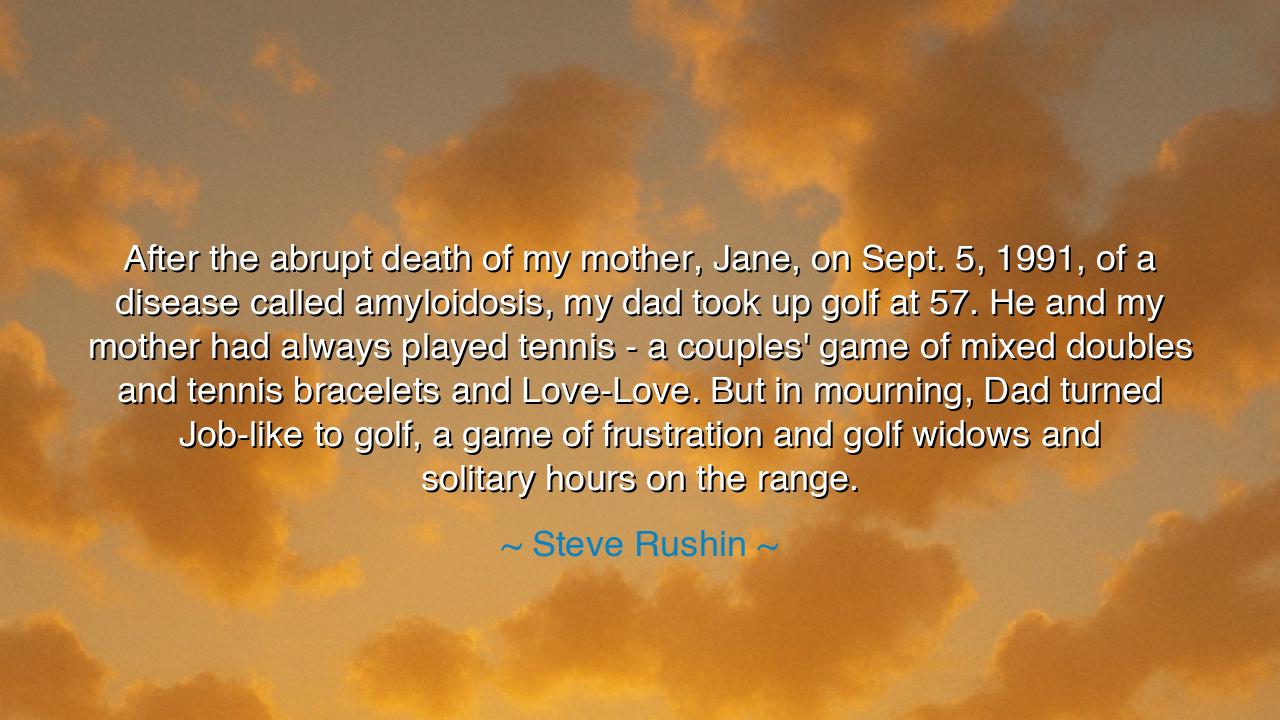
After the abrupt death of my mother, Jane, on Sept. 5, 1991, of a
After the abrupt death of my mother, Jane, on Sept. 5, 1991, of a disease called amyloidosis, my dad took up golf at 57. He and my mother had always played tennis - a couples' game of mixed doubles and tennis bracelets and Love-Love. But in mourning, Dad turned Job-like to golf, a game of frustration and golf widows and solitary hours on the range.






"After the abrupt death of my mother, Jane, on Sept. 5, 1991, of a disease called amyloidosis, my dad took up golf at 57. He and my mother had always played tennis—a couples' game of mixed doubles and tennis bracelets and Love-Love. But in mourning, Dad turned Job-like to golf, a game of frustration and golf widows and solitary hours on the range." Thus wrote Steve Rushin, not merely recounting a family memory, but revealing a profound truth about grief, endurance, and the strange rituals of healing. Beneath the quiet image of a man on a lonely golf course lies a story as old as time: how the human heart, when broken, seeks meaning in rhythm, solitude, and repetition.
The death of a beloved—especially of one who shared your daily life, your habits, and your laughter—leaves not just emptiness, but disorientation. It is as though the world, once filled with shared purpose, becomes a wilderness of silence. For Rushin’s father, who had long known the joy of partnership through tennis—a sport of companionship, of volley and return—his wife’s passing shattered not only his heart, but the rhythm of his days. Tennis had been a dialogue, a dance of two souls across a net. In her absence, he turned to golf, a game of solitude. Where once there had been “Love-Love,” now there was silence and the long echo of a ball struck into the distance.
Rushin calls his father’s turn to golf “Job-like,” invoking the biblical man of sorrows whose faith was tested by loss. Like Job, the father did not rage or abandon his world; he sought understanding through endurance. In golf—a game defined by imperfection, patience, and the acceptance of failure—he found a mirror for grief itself. Each missed swing, each errant ball, was a small parable of human struggle. Yet, through persistence, one finds rhythm again. In this way, golf became his father’s mourning ritual, a discipline of quiet suffering through which he slowly relearned to live.
There is ancient wisdom in this transformation. The Greeks believed that rituals of repetition—the practice of arts, the tending of gardens, the training of the body—could purify the soul in times of loss. When Orpheus lost Eurydice, he did not cease to sing; he sang all the more, filling the emptiness with music until he, too, was consumed by his longing. Rushin’s father, too, filled the void not with words, but with action—swing after swing, hour after hour on the range. The solitude of the game became his sacred ground, where memory could breathe without the noise of the world.
It is easy for the young to mock such rituals, to see in them only futility or escape. But those who have known deep sorrow understand this truth: grief must move. It cannot remain still, lest it turn to stone in the heart. Some write; some pray; some walk for miles. Rushin’s father played golf—not for victory, but for solace. Each hole was a small journey, each course a meditation. Through this discipline, he found the slow rhythm of acceptance, the quiet peace that comes when grief becomes part of one’s being rather than an open wound.
This story, though deeply personal, reflects a universal law of the human spirit: when the world collapses, one must build again, even from ashes. To do so, one must first find a form—a ritual, a practice, a habit—that holds the broken pieces together until meaning returns. Golf was not a cure, but a vessel for Rushin’s father’s sorrow. In his steady, deliberate swings, he was not chasing a score; he was speaking with the silence, learning how to live again without the echo of “Love-Love.”
So, my child, learn this: when grief finds you—and it will—do not flee from its weight, nor hide from its silence. Instead, find your ritual of endurance. It may be a song, a craft, a prayer, or a quiet walk beneath the trees. Let your sorrow move through your hands, through your breath, through the discipline of doing. For as Steve Rushin’s tale reminds us, love does not end with death; it transforms into the work of living faithfully in its memory.
And when you stand alone, as his father once did, looking out upon the vast fields of your life, remember: the act of persistence, however small, is sacred. To keep moving, to keep trying, even when the heart is heavy—that is how the human spirit honors those it has lost. In the game of life, as in golf, perfection is not the goal. The goal is to keep playing, one swing, one breath, one day at a time.






AAdministratorAdministrator
Welcome, honored guests. Please leave a comment, we will respond soon